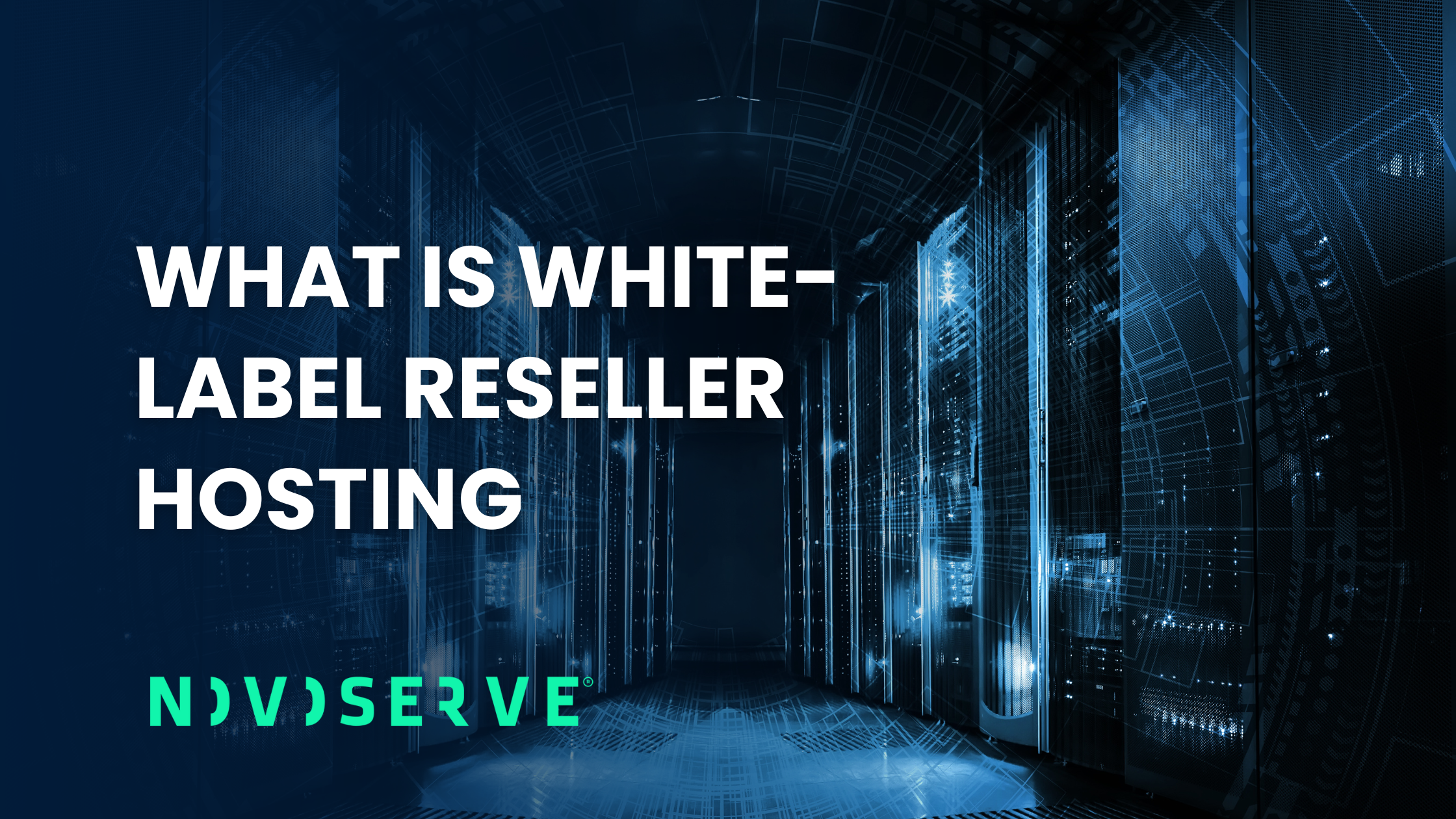White label hosting is the fastest way for digital agencies, MSPs, and entrepreneurs to launch a hosting business without the capital expense of building a data center or managing the data center operations.
For the end-user, the experience is seamless. They believe they are buying directly from you. But behind the scenes, a provider like NovoServe handles the power, network, and hardware. We’ll discuss how white label hosting works, the technical requirements for true invisibility (like BYOIP), and how you can find a white label hosting reseller partner.
How Does White Label Hosting Work?
When you sign up for a white label reseller program, you are essentially renting a portion of a data center's capacity—whether that is specific bandwidth, storage, or entire bare metal servers.
You then partition these resources to create individual accounts for your clients. Using control panels like WHM/cPanel, DirectAdmin, or platforms like WHMCS, you manage the customer lifecycle completely independently.
The "White Label" Distinction What makes white label hosting reseller services unique is the removal of the provider's branding.
- The Interface: Your clients log into a control panel with your logo.
- The Support: You handle the first line of communication.
- The Billing: The invoice comes from your company, not your server provider.
This allows freelancers and agencies to add a recurring revenue stream to their existing services (like web design or SEO) without their clients knowing a third party is involved.
White Labeling with BYOIP and ASN
This is where white label server hosting goes beyond just a custom logo.
Many white label reseller programs claim to be invisible, but savvy users can still find the upstream provider by running a simple "WHOIS" or IP lookup. To be a truly independent hosting brand, you need network-level white labeling.
At NovoServe, we support advanced technical white-labeling features that ensure total brand isolation:
✅ BYOIP (Bring Your Own IP)
In a standard reseller setup, you use the provider's IP addresses. If a client looks up that IP, they see "NovoServe". With BYOIP, you bring your own IP ranges. We announce them on our network, but they remain registered to your company. To the outside world, the traffic originates from you.
✅ Announce Your Own ASN
An Autonomous System Number (ASN) is the unique identifier for a network on the internet. We allow you to announce your own ASN on our global backbone. This means your network path looks entirely independent.
By utilizing BYOIP and custom ASNs, you aren't just reselling; you are operating a virtual network on top of our physical infrastructure. This is the gold standard for white label reseller hosting.
What to Look For in a White Label Hosting Provider
Choosing the right parent provider is critical for long-term success. Since your own reputation depends on their service quality, take time to evaluate them thoroughly. Here are key factors to consider:
✅ Reliability & Performance
Uptime and speed directly affect your clients' satisfaction. Look for providers with robust infrastructure—preferably using enterprise-grade hardware like HPE or Supermicro—and strong SLAs (Service Level Agreements) guaranteeing uptime (ideally 99.9% or higher). SSD/NVMe storage and optimized CPU configurations also contribute to consistent performance.
✅ Global Network & Routing OptimizationIf your clients are geographically diverse, the hosting provider’s global connectivity becomes crucial. Look for data centers strategically located in key markets (e.g., US East Coast, Europe, Asia). Providers that offer optimized routing paths can significantly improve end-user experience.
✅ Scalability and FlexibilityAs your client base grows, your infrastructure needs will change. Choose a provider that allows you to upgrade resources or move to more powerful bare metal servers without major downtime. Flexibility in billing cycles, server customization, and storage options are also valuable.
✅ White-Label Support and BrandingA true white-label environment should let you fully brand the customer experience—from the control panel to email templates. Look for providers that offer unbranded IPs, nameservers, and email alerts. This helps maintain your brand’s identity.
✅ Security FeaturesSecurity is a major concern for hosting clients. Ensure the provider includes essential features such as:
- DDoS protection
- Regular backups or backup snapshots
- Free or affordable SSL certificates
- Malware scanning and firewall tools
- IP whitelisting and multi-factor authentication These services not only protect your clients but also reduce your support workload.
Reseller hosting often relies on automation to stay profitable. Choose a provider that integrates well with WHM/cPanel, WHMCS, and domain registrars. APIs for provisioning, billing, and customer management streamline your backend operations.
✅ Responsive and Skilled SupportYou’ll likely be handling Level 1 support, but for anything more technical, your parent provider becomes your lifeline. Test their support responsiveness—via ticket, email, or phone—and evaluate how deep their technical expertise is. Providers that offer 24/7 multilingual support are ideal for resellers with international clients.
✅ Transparent Pricing and Resource AllocationUnderstand exactly what you’re paying for—CPU cores, RAM, storage, bandwidth, IPs—and whether they’re shared or dedicated. Unexpected throttling or vague policies can ruin client relationships. Also, check for hidden fees such as for IP addresses, bandwidth overages, or support beyond a certain tier.
✅ Reputation and Customer ReviewsA provider’s track record is a good predictor of your future experience. Read recent reviews on platforms like Reddit, or industry forums. Look for consistency in uptime, transparency, and technical competence.

Is White Label Reseller Hosting Profitable?
Yes, reseller hosting can be profitable—especially when built on top of reliable, high-performance infrastructure. The core business model is based on buying hosting resources in bulk and reselling them in smaller packages with added value and support.
Take for example a premium bare metal server such as an HPE DL360 Gen10 with 8SFF bays and 1 Gbps unmetered bandwidth. At a cost of around €300/month, this server can be partitioned into dozens of shared hosting accounts, each resold for €5 to €25 per month depending on resource allocation, features, and target audience.
This allows for a healthy margin, even after accounting for your personel support overhead. Profitability increases if you provide additional services like backups, email hosting, SSL certificates, or website maintenance.
Some hosting resellers may even bundle hosting with web design, SEO, or development services—creating recurring income streams from clients who rely on them for more than just infrastructure. The key to profitability lies in efficient resource management, excellent customer support, and offering solutions tailored to your niche market.
Start Your White Label Hosting Business
White label reseller hosting offers a scalable way to enter the market without the CAPEX of building a data center. Whether you are adding hosting to an agency portfolio or launching a pure-play hosting brand, success lies in control.
At NovoServe, we provide the raw power, the network, and the advanced tools (like BYOIP) to let you build a brand that looks and feels like a Tier-1 provider.
Ready to become a white label hosting reseller?
- Browse our Dedicated Servers to find your base infrastructure.
- Download our white label reseller hosting program.
- Contact Sales to discuss BYOIP and network customization.
Leave the hardware to us. Build your brand with NovoServe.




